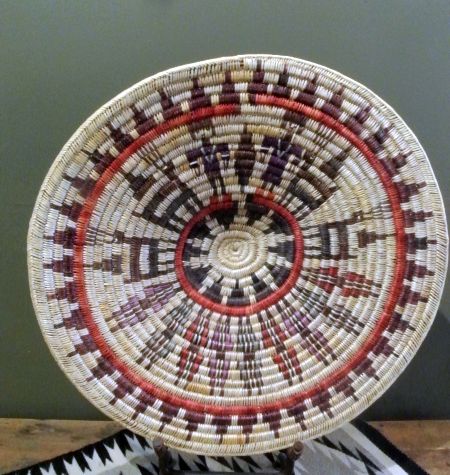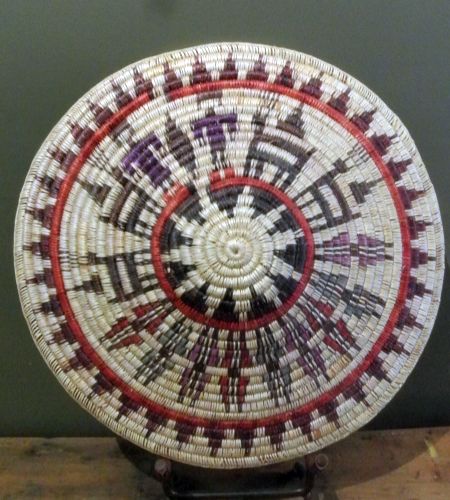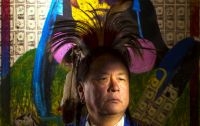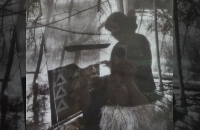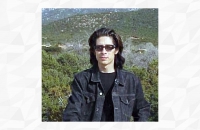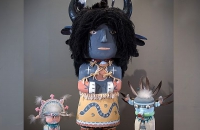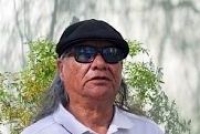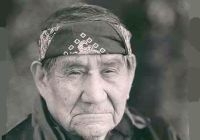B160 Navajo Wedding Basket
Contemporary wedding basket by Navajo basket weaver Mary Holiday Black. The 22 1/2” x 8” basket depicts a bride and groom along with two deer set in a Navajo pattern.
The matriarch of a large and talented family of basket weavers, Mary Holiday Black has not only done much to preserve the tradition of Navajo basketry, she has revolutionized it with her daring creativity. Recognized by experts as the nation's preeminent Navajo basket weaver, Mary's pieces are highly valued collector's items, selling for as much as eight thousand dollars.
Call for Shipping
About the artist
Mary Holiday Black
Mary Black – Basketweaver. Considered primarily responsible for the preservation and renaissance of the art of Navajo basketry, Mary Holiday Black is a legend in her own time. Mary received the Utah Governor's 1995 Folk Art Award, and in September of 1996 a $10,000 National Heritage Fellowship Award from the National Endowment for the Arts, which was presented to her in Washington D.C. by First Lady Hillary Clinton.
Mary Holiday Black was born about 1934 high atop the Douglas Mesa near the northern boundary of the Navajo reservation in Utah's Monument Valley. A member of the Bitter Water Clan, she was raised in a community of traditional Navajo artists and religious practitioners and never learned to speak English. Her mother was a rug weaver and her father was a medicine man. At age 11, she learned to weave rugs from her mother and baskets from a friend of her grandmother's. She learned not only the techniques of gathering, cutting, dyeing, and weaving the willow (sumac), but also the rich store of meaning associated with baskets.
The matriarch of a large and talented family of basket weavers, Mary Holiday Black has not only done much to preserve the tradition of Navajo basketry, she has revolutionized it with her daring creativity. Recognized by experts as the nation's preeminent Navajo basket weaver, Mary's pieces are highly valued collector's items, selling for as much as eight thousand dollars.
Mary's story has been written and rewritten, but it is a story worth the telling, for she has kept a centuries old art form from extinction. In 1960 it is estimated that there were only a dozen active basket makers on the Navajo reservation, most women having turned to the more profitable art of rug weaving. One of the basket weavers was Mary Black.
In the 1970s, encouraged by a burgeoning Native American art market and local traders, Black focused her creative work on basket
weaving and introduced several innovations that proved critical to the tradition's survival. First, she stretched the traditional limitations of design, keeping the black-white-and-red color scheme but expanding the baskets beyond the size appropriate for ceremonial use. Some of her coiled-tray "wedding baskets," used in a number of ceremonial rituals, reached five feet in diameter. She also expanded the jar, the other principal extant Navajo basket type, far beyond its previous size.
Later, Black took up the vegetable dyes whose use she had learned from her mother, creating subtle hues and shades not possible with artificial dyes. She introduced new motifs gleaned from prehistoric Anasazi and Mimbres pottery and rock art and from other tribes of the Southwest. She also borrowed imagery from other Navajo crafts, especially sand painting and rug weaving, incorporating both geometric designs and images with religious significance, like the yei-be-chei (supernatural beings), into her baskets. In many instances this pictorial style alludes to mythological scenes, spiritual figures, legends, and scenes from everyday life, leading many to label these creations "story baskets."
Taught to weave by her grandmother's relative when she was 11, Mary has spent over half a century creating baskets for sacred ceremonial purposes as well as the art world, sharing her knowledge with anyone willing to learn. Nine of Mary's eleven children have followed in her footsteps, becoming world class weavers in their own right.
"One of the reasons we want to keep basketmaking going among our people," Mary says, "is because they are important when a person gets healed, to bring rain, for weddings, the Fire Dance, the Seven-Day Ceremony."
Each basket has a story. 'There are many basket stories," Mary says. "If we stop making the baskets, we lose the stories."
Each ceremonial basket also has an accompanying song. Mary knows the songs and other tribal lore because of her parents, Teddy and Betty Holiday, who were medicine people. Strict tribal taboos dictating how and when ceremonial baskets can be woven contribute to their scarcity. Mary has successfully challenged some of the taboos, arguing in favor of preserving cultural history through basketry.
Mary was also one of the first to consider weaving baskets with imaginative designs targeted toward the Indian art collector's market. Many of her baskets depict traditional beliefs, stories or legends; some inspired by Navajo sand paintings.
Working daily, a basket may take up to four months to complete. Mary's hands often ache from the tedious strain of weaving as she keeps constant pressure on a basket's sides so they will curve upward when it's finished. 'These days my hands get tired, and I have to light a fire and pray for energy," she has said, 'They are not as quick as when I was a child."

